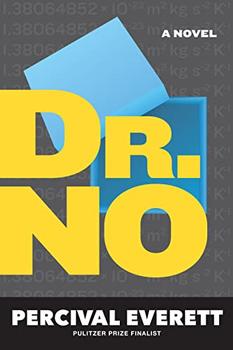Summary | Reading Guide | Discuss | Reviews | Beyond the book | Read-Alikes | Genres & Themes | Author Bio

Percival Everett's blistering satire about race and publishing, now adapted for the screen as American Fiction, directed by Cord Jefferson and starring Jeffrey Wright and Tracee Ellis Ross.
Thelonious "Monk" Ellison's writing career has bottomed out: his latest manuscript has been rejected by seventeen publishers, which stings all the more because his previous novels have been "critically acclaimed." He seethes on the sidelines of the literary establishment as he watches the meteoric success of We's Lives in Da Ghetto, a first novel by a woman who once visited "some relatives in Harlem for a couple of days." Meanwhile, Monk struggles with real family tragedies―his aged mother is fast succumbing to Alzheimer's, and he still grapples with the reverberations of his father's suicide seven years before.
In his rage and despair, Monk dashes off a novel meant to be an indictment of Juanita Mae Jenkins's bestseller. He doesn't intend for My Pafology to be published, let alone taken seriously, but it is―under the pseudonym Stagg R. Leigh―and soon it becomes the Next Big Thing. How Monk deals with the personal and professional fallout galvanizes this audacious, hysterical, and quietly devastating novel.
Erasure is many different things. It is narratively challenging—including not just the internal novel but additional snippets of Monk's writing, bursts of Latin and French, and other textual tidbits not immediately obvious in meaning—yet still relatively straightforward, accessible enough to enjoy from beginning to end without picking apart too much. That is, if you choose not to dwell on Monk's notes and elaborations, and thereby miss out on the pleasure of getting lost in a Joycean thicket. It is a linear and entertaining, if dramatic and fever-dreamish, series of events. Its relationship to real-world culture has shifted, somewhat, since first publication. As Everett commented in 2024, the landscape of American publishing has changed in the ensuing years, though the simplified thinking around race that created the conditions featured in Erasure remains. Perhaps partly because of this, it doesn't seem outdated, but another reason for its ongoing relevance is its seemingly endless layers...continued
Full Review
 (1229 words)
(1229 words)
(Reviewed by Elisabeth Cook).
 Percival Everett's 2001 novel Erasure was adapted for film as American Fiction in 2023, leading to director Cord Jefferson's Oscar win for Best Adapted Screenplay. The year after, Everett's new novel James scooped up major awards, including the National Book Award and the Pulitzer Prize. While these exposures and honors gained him some long overdue stature in the world of mainstream literature, Everett had already built a decades-long career with his inventive, often satirical, and frequently acclaimed literary novels. He may be more adept than any other contemporary writer at marrying low-brow tropes with high-brow concepts—or rather, making these categories lose all meaning. Despite some distinctive elements to his writing style, ...
Percival Everett's 2001 novel Erasure was adapted for film as American Fiction in 2023, leading to director Cord Jefferson's Oscar win for Best Adapted Screenplay. The year after, Everett's new novel James scooped up major awards, including the National Book Award and the Pulitzer Prize. While these exposures and honors gained him some long overdue stature in the world of mainstream literature, Everett had already built a decades-long career with his inventive, often satirical, and frequently acclaimed literary novels. He may be more adept than any other contemporary writer at marrying low-brow tropes with high-brow concepts—or rather, making these categories lose all meaning. Despite some distinctive elements to his writing style, ...

If you liked Erasure, try these:

by Danzy Senna
Published 2025
A brilliant dark comedy about love and ambition, failure and reinvention, and the racial- identity-industrial complex from the bestselling author of Caucasia.

by Percival Everett
Published 2022
A sly, madcap novel about supervillains and nothing, really, from an American novelist whose star keeps rising.